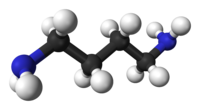
Photo from wikipedia
BACKGROUND Ultraviolet B (UV-B) radiation can enhance the accumulation of phenolic compounds (PCs) in barley seedling, although this may result in severe oxidative damage. In the present study, the role… Click to show full abstract
BACKGROUND Ultraviolet B (UV-B) radiation can enhance the accumulation of phenolic compounds (PCs) in barley seedling, although this may result in severe oxidative damage. In the present study, the role of spermidine in alleviating oxidative damage and regulating synthesis of PCs in barley seedlings under UV-B stress was investigated. RESULTS Exogenous spermidine increased the length and fresh weight as well as PCs contents of barley seedlings under UV-B stress. Application of dicyclohexylamine, an inhibitor of endogenous spermidine synthesis, significantly inhibited the growth and PC accumulation of barley seedlings under UV-B stress, although this inhibitory effect can be alleviated by exogenous spermidine. Exogenous spermidine increased the contents of vanillic acid, syringic acid, protocatechuic acid and p-coumaric acid in barley seedlings under UV-B stress by 20-200% through enhancing the activities of enzymes related to synthesis of these acids. In addition, exogenous spermidine enhanced activities and gene expression of antioxidant enzymes in barley seedlings under UV-B stress, including peroxidase, glutathione reductase and glutathione S-transferase. CONCLUSION Spermidine can alleviate oxidative damage of barley seedlings under UV-B stress and enhance the accumulation of PCs. © 2022 Society of Chemical Industry.
Journal Title: Journal of the science of food and agriculture
Year Published: 2022
Link to full text (if available)
Share on Social Media: Sign Up to like & get
recommendations!